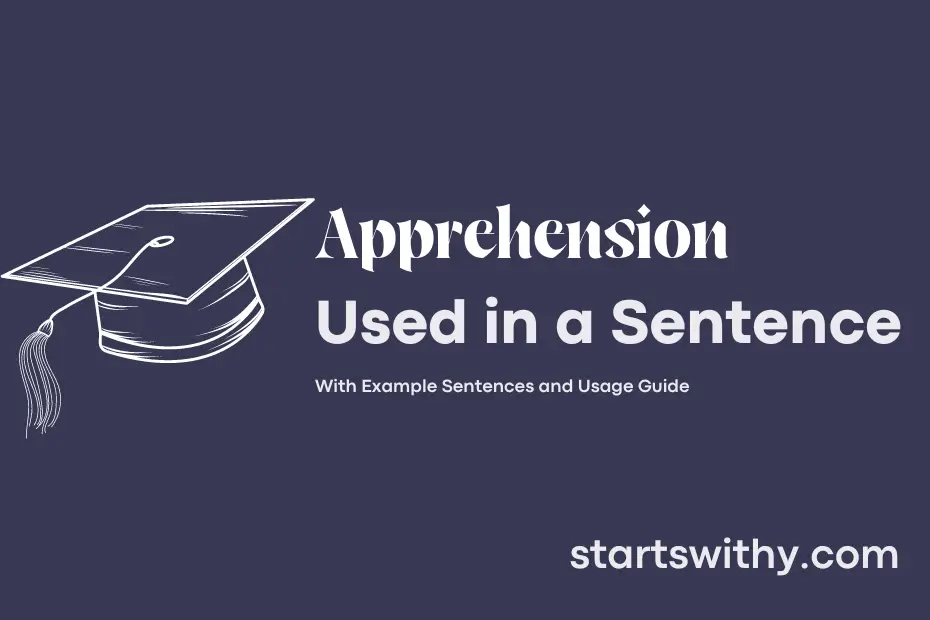Have you ever felt a sense of unease or nervousness about something unknown? That feeling is what we call apprehension. Apprehension is the anticipation of a potentially negative or fearful outcome, causing feelings of anxiety or uncertainty.
It’s common to experience apprehension in situations that are unfamiliar or where the outcome is uncertain. This feeling can range from mild unease to intense fear, influencing our thoughts and behaviors. Let’s explore how apprehension affects us and how we can manage it in various scenarios.
7 Examples Of Apprehension Used In a Sentence For Kids
- Apprehension is when we feel a little scared or worried.
- It’s normal to feel apprehension before trying something new.
- We can talk to a friend or teacher about our apprehension.
- Taking deep breaths can help calm our apprehension.
- We can overcome apprehension by facing our fears one step at a time.
- Remember, it’s okay to feel apprehension sometimes.
- With a little courage, we can conquer our apprehension!
14 Sentences with Apprehension Examples
- It is natural to feel apprehension before giving a presentation in front of your college classmates.
- As a college student, many experience a sense of apprehension before taking on a challenging internship opportunity.
- Apprehension about upcoming exams is common among college students, but with proper preparation, it can be overcome.
- The thought of attending a networking event can often lead to feelings of apprehension for college students.
- Stepping into a leadership role within a college club may bring about a sense of apprehension for some students.
- Students may feel a sense of apprehension before diving into a new research project at the college level.
- The prospect of starting a new semester online can evoke apprehension for college students adjusting to remote learning.
- Feeling apprehension on the first day of college is normal, but it often fades as students settle into their routine.
- The idea of studying abroad can spark a mix of excitement and apprehension for college students exploring new opportunities.
- Many college students experience apprehension when it comes to reaching out to professors for help or guidance.
- Apprehension can arise when college students are faced with making important decisions about their future career paths.
- Navigating social situations in college can trigger feelings of apprehension for students who may be more introverted.
- Balancing academics, extracurricular activities, and a social life can lead to feelings of apprehension among college students striving for success.
- The pressure to meet high academic expectations can create apprehension for college students aiming for top grades.
How To Use Apprehension in Sentences?
Apprehension is a feeling of unease or fear about something that may happen in the future. Beginner writers may find it challenging to use this word in a sentence, but with practice, it can become easier. Here’s a simple guide on how to use apprehension in a sentence:
-
Subject-Verb-Object Structure: The most basic way to use apprehension in a sentence is by following the subject-verb-object structure. For example, “She felt apprehension before taking the exam.”
-
Adjective + Noun: Another common way to use apprehension in a sentence is by combining it with an adjective and a noun. For instance, “His silent apprehension was palpable in the room.”
-
Preposition Phrases: You can also use apprehension with preposition phrases to add more detail to your sentence. For example, “Despite his nervous apprehension, he decided to face his fears.”
-
Conjunctions: Utilize conjunctions to connect ideas and create complex sentences. For instance, “She was filled with apprehension, yet she knew she had to confront her fears.”
Remember that apprehension is a versatile word that can be used in various contexts to convey feelings of worry, fear, or uncertainty. Practice incorporating it into your writing to become more comfortable with using it effectively in sentences.
Conclusion
In conclusion, apprehension can manifest in various ways within sentences, indicating fear, unease, or anticipation. For instance, “She walked through the dark alley with apprehension, fearing for her safety,” illustrates a sense of fear and caution. Conversely, “The student awaited the exam results with apprehension, hoping for a good outcome,” shows a mix of nervousness and expectation.
Through these examples, it is evident that apprehension adds depth and emotion to sentences, enriching the reader’s understanding of the underlying feelings and circumstances. Whether expressing worry, anticipation, or hesitation, sentences containing apprehension effectively convey the emotional complexity of human experiences. So next time you encounter this term in writing, take note of the nuanced emotions and intentions it can convey.



